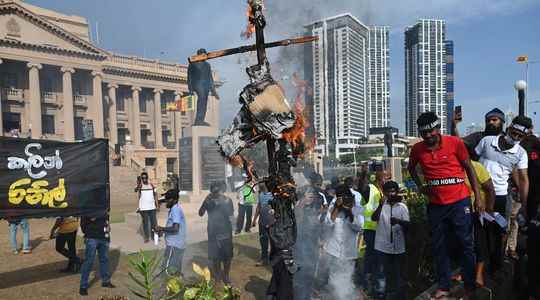Chased by the street at the beginning of July, the former Sri Lankan president Gotabaya Rajapaksa, in exile in Singapore, would already think about returning to the country. “He is not hiding and I believe he will return,” the Sri Lankan government spokesman said on Tuesday July 26. The hated ex-president, renowned for his brutality, had nevertheless been forced into a shameful flight on July 9th. That day, tens of thousands of people had managed to take up the residence of the strong man of Sri Lanka, who then flew to Singapore.
The Aragalaya (struggle, in Sinhalese), the citizens’ movement which had been calling for his resignation for months, seemed to have achieved the impossible. The Rajapaksa clan, which dominated the political life of the island of 22 million inhabitants for nearly two decades, is accused of having plunged the country into an abyssal crisis. Sri Lanka lives to the rhythm of shortages. The queues at gas stations stretch for miles. The inhabitants lack everything and 80% of the population skips meals to cope with shortages and soaring prices which are reaching record levels. In June, food inflation exceeded 80%.
The Rajapaksa clan still in control
But this spectacular street victory already seems to be only a memory, since the election of Gotabaya Rajapaksa’s successor. Handily elected by Parliament on July 20, Ranil Wickremesinghece, a Sri Lankan political cacique, enjoyed the support of the Rajapaksa party, which still has the majority in the hemicycle. “The voice of the people has not been heard and we are in the streets, because the Parliament does not represent us”, regrets Rathidu Senarathna, a demonstrator who has participated in the protest movement since April.
The demonstrators also do not want Ranil Wickremesinghe, whom they accuse of having protected the Rajapaksa clan. He is notably accused of having protected Gotabaya Rajapaksa and his brother Mahinda from legal proceedings for corruption and human rights violations, when he was Prime Minister, from 2015.
“The discontent of the population is immense, because structurally nothing has changed, the Rajapaksa still control the Parliament and the possibility of violence increases, the attitude of the State pushes the people to become radicalized, while the movement has so far It was peaceful,” said Amita Arudpragasam, a Sri Lankan analyst. Less than twenty-four hours after his swearing in, the new leader, Ranil Wickremesinghe, effectively ordered the expulsion of the demonstrators who were still occupying the presidential secretariat. Hundreds of soldiers and police violently dislodged them on the night of July 21 to 22, when the demonstrators had announced a few hours earlier their intention to evacuate the premises of their own accord. This show of force drew criticism from the international community and human rights organizations.
Safety plan
While Ranil Wickremesinghe has a reputation as a pro-Western reformer, his heavy-handed response threatens to jeopardize the political stability the country needs to turn the economy around. Sri Lanka, which has declared itself in default on its external debt of 51 billion dollars, is trying to obtain a rescue plan from the International Monetary Fund (IMF). But the negotiations were interrupted by political events.
To unlock IMF aid, the country must first prove the viability of its debt and renegotiate with all of its creditors – in particular China, Japan, India or the World Bank. This might take some time.
Support from India
“The biggest challenges will be in the next six months until an agreement can be reached with the IMF, as Sri Lankans will continue to face shortages and prices will continue to rise” , says Amita Arudpragasam. The island of 22 million people is already benefiting from aid from neighboring countries, including India, which has provided support to the tune of $3.8 billion in lines of credit since the start of the year. .
Once considered an example of economic success in South Asia, Sri Lanka today sounds like a sad warning throughout the world. “Countries with high debt thresholds and limited room for maneuver will face additional strains,” IMF managing director Kristalina Georgieva warned at the G20 summit on July 16. The situation in Sri Lanka, for example, is a wake-up call.”
